Issue :- 2
Treatment of All Skin Problems With Unani is The Best Treatment
Acne
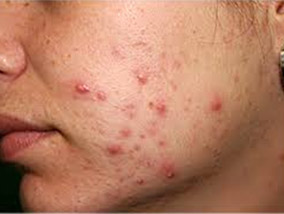
There are different types of acne. The most common acne is the type that develops during the teen years. Puberty causes hormone levels to rise, especially testosterone. These changing hormones cause skin glands to start making more oil (sebum). Oil releases from the pores to protect the skin and keep it moist. Acne begins when oil mixes with dead cells and clogs the skin's pores. Bacteria can grow in this mixture. And if this mixture leaks into nearby tissues, it causes swelling, redness, and pus. A common name for these raised bumps is pimples.
Acne develops most often on the face, neck, chest, shoulders, or back and can range from mild to severe. It can last for a few months, many years, or come and go your entire life. Mild acne usually causes only whiteheads and blackheads. At times, these may develop into an infection in the skin pore (pimple). Severe acne can produce hundreds of pimples that cover large areas of skin. Cystic lesions are pimples that are large and deep. These lesions are often painful and can leave scars on your skin.
Acne can lead to low self-esteem and sometimes depression. These conditions need treatment along with the acne.
Eczema
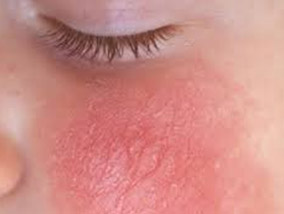
Eczema symptoms include itchy, red, and dry skin caused by inflammation. It's most commonly found in children, although adults can get it. It is also called atopic dermatitis and is treated with oral medications, steroid creams and light therapy .
The most common type of eczema -- atopic dermatitis -- resembles an allergy. But the skin irritation, which is more often seen in children rather than adults, is not an allergic reaction.
The current thinking is that eczema is caused by a combination of factors that include:
- Genetics.
- Abnormal function of the immune system.
- Environment.
- Activities that may cause skin to be more sensitive.
- Defects in the skin barrier that allow moisture out and germs in.
What Are the Symptoms of Eczema?
Almost always, your skin will itch before a rash appears in eczema.
Typically, eczema shows itself as:
- Patches of chronically itchy, dry, thickened skin, usually on the hands, neck, face, and legs (but it can occur anywhere). In children, the inner creases of the knees and elbows are often involved.
- If scratched, dry patches of skin and open sores with crusts may develop and may get infected.
- You develop numerous painful, small, fluid-filled blisters in the areas of eczema. You may have eczema herpeticum, a rare but potentially serious complication caused by the herpes simplex virus.
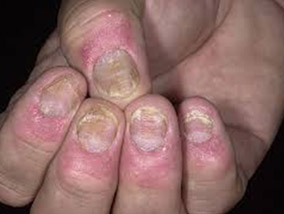
Psoriasis
Psoriasis is a chronic skin condition caused by an overactive immune system. Symptoms include flaking, inflammation, and thick, white, silvery, or red patches of skin.
- Raised, bright red patches of skin often covered with loose, silvery scales, usually on the knees, elbows, or low back.
- Tiny areas of bleeding when skin scales are picked or scraped off.
- Mild scaling to thick, crusted plaques on the scalp.
- Itching, especially during sudden flare-ups or when the psoriasis patches are in body folds, such as under the breasts or buttocks.
- Discolored or pitted nails.
- Similar plaques in the same area on both sides of the body (for example, both knees or both elbows).
- Flare-ups of many raindrop-shaped patches (guttate psoriasis).
- Joint swelling, tenderness, and pain (psoriatic arthritis).
- Psoriasis patches that appear after an injury, such as a cut, a burn, or too much sun. This is called Koebner's phenomenon. Because this response is common, it's important for people with psoriasis to avoid irritating or injuring their skin.
- Extreme stress.
- Exposure to ultraviolet light, usually from sunlight.
- Smoking.
- Some medications and antibiotics, especially those in the sulfa and penicillin groups.
- Some infections, such as cytomegalovirus (CMV), parvovirus (such as fifth disease), hepatitis C infections, and the Epstein-Barr virus (in children).
- Achy joints (arthralgia), arthritis, and swollen joints, especially in wrists, small joints of the hands, elbows, knees, and ankles.
- Swelling of the hands and feet due to kidney problems.
- Fever of more than 100 degrees F (38 degrees C).
- Prolonged or extreme fatigue.
- Skin lesions or rashes, especially on the arms, hands, face, neck, or back.
- Butterfly-shaped rash (malar rash) across the cheeks and nose.
- Anemia (oxygen carrying deficiency of red blood cells).
- Pain in the chest on deep breathing or shortness of breath.
- Sun or light sensitivity (photosensitivity).
- Hair loss or alopecia.
- Abnormal blood clotting problems.
- Raynaud's phenomenon: fingers turn white and/or blue or red in the cold.
- Seizures.
- Mouth or nose ulcers.
- Weight loss or gain.
- Dry eyes.
- Easy bruising.
- Anxiety, depression, headaches, and memory loss.
- Achy joints (arthralgia), arthritis, and swollen joints, especially in wrists, small joints of the hands, elbows, knees, and ankles.
- Swelling of the hands and feet due to kidney problems.
- Fever of more than 100 degrees F (38 degrees C).
- Prolonged or extreme fatigue.
- Skin lesions or rashes, especially on the arms, hands, face, neck, or back.
- Butterfly-shaped rash (malar rash) across the cheeks and nose.
- Anemia (oxygen carrying deficiency of red blood cells).
- Pain in the chest on deep breathing or shortness of breath.
- Sun or light sensitivity (photosensitivity).
- Hair loss or alopecia.
- Abnormal blood clotting problems.
- Raynaud's phenomenon: fingers turn white and/or blue or red in the cold.
- Seizures.
- Mouth or nose ulcers.
- Weight loss or gain.
- Dry eyes.
- Easy bruising.
- Anxiety, depression, headaches, and memory loss.
- Kidneys - serious kidney damage is a primary cause of death for lupus sufferers.
- Central nervous system - lupus can cause headaches, dizziness, memory problems, seizures, and behavioral changes.
- Blood and vessels - lupus causes an increased risk of anemia, bleeding, blood clotting, and vessel inflammation.
- Lungs - noninfectious pneumonia and difficulty breathing due to inflammation of the chest cavity are more likely with lupus.
- Heart - heart muscle and artery inflammation are more likely with the disease, and lupus increases the chances of cardiovascular disease and heart attacks..
- Infection - lupus treatments tend to depress the immune system making your body more vulnerable to infection.
- Cancer - lupus increases the risk of cancer, especially of non-Hodgkin's lymphoma, lung cancer, and liver cancer.
- Bone tissue death - a lower blood supply to bone tissue leads to tiny breaks and eventual death of bone. This is most common in the hip bone.
- Pregnancy - lupus increases the risk of miscarriage, hypertension during pregnancy, and preterm birth.
Psoriasis - Symptoms
There are several types of psoriasis. Symptoms for each type may vary, but the major symptoms are:
Other symptoms of psoriasis may include:
Psoriasis - Symptoms
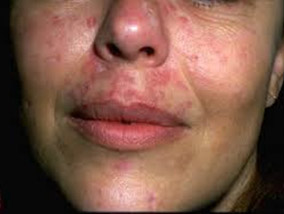
Lupus is an autoimmune disease where the body's immune system becomes hyperactive and attacks normal, healthy tissue. This results in symptoms such as inflammation, swelling, and damage to joints, skin, kidneys, blood, the heart, and lungs.
Under normal function, the immune system makes proteins called antibodies in order to protect and fight against antigens such as viruses and bacteria.
Lupus makes the immune system unable to differentiate between antigens (a substance capable of inducing a specific immune response) and healthy tissue. This leads the immune system to direct antibodies against the healthy tissue - not just antigens - causing swelling, pain, and tissue damage.
What causes lupus?
Although doctors are do not know exactly what causes lupus and other autoimmune diseases, most believe that lupus results from both genetic and environmental stimuli.
Since lupus is known to occur within families, doctors believe that it is possible to inherit a genetic predisposition to lupus. There are no known genes, however, that directly cause the illness. It is probable that having an inherited predisposition for lupus makes the disease more likely only after coming into contact with some environmental trigger.
The higher number of lupus cases in females than in males may indicate that the disease can be triggered by certain hormones.
Physicians believe that hormones such as estrogen regulate the progression of the disease because symptoms tend to flare before menstrual periods and/or during pregnancy.
Certain environmental factors have been known to cause lupus symptoms. These include:
Lupus episodes, or flares, are usually noted by a worsening of some of the following symptoms:
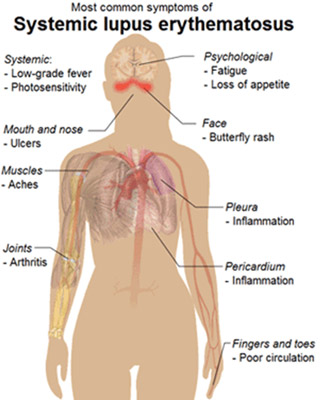
Lupus can also lead to complications in several areas of the body. These include:
.jpg)
Nomination form for 2020 Global Awards
https://www.unaniherbal.org/nomination-form.html
For Consultation click here
Copyright 2014 Unani Herbal
If you wish to cancel your subscription to this newsletter click here






